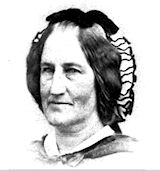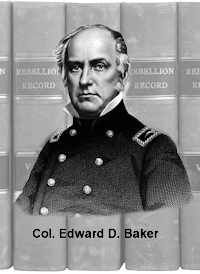March 29.—This day, Col. Geary’s advance encountered three hundred of Stuart’s and White’s rebel cavalry, and a force of rebel infantry, at Middleburg, Va. He marched from Philomont in the morning, and drove in the rebel pickets outside of Middleburg,[1] when he entered the town, and discovered the infantry in retreat, and the cavalry posted to make a stand.
A gun was placed to command the main street, and the Twenty-eighth regiment advanced by all the approaches to the town, while the main body rushed through it with bayonets fixed, and on a “double-quick,” driving the enemy before them. The rebels made a halt in a hollow beyond the town, evidently manoeuvring to draw out the Michigan cavalry in pursuit, so their infantry might flank them. Companies of the Twenty-eighth now opened on them from behind stone fences, with their rifles, when the cavalry dashed off precipitately. A gun of the Twenty-eighth, in the centre of the town, was brought to bear upon them, and drove them from a thicket two miles distant, every shell exploding in the woods.
The charge through the town was fraught with great excitement. Knapsacks were thrown aside in the street as the men rushed forward. Overcoats and blankets lined the sides of the road. Stores were speedily closed, women screamed, horses dashed forward. Everything was excitement, but in good order. Col. Geary pushed on at the head, and at one time was within two hundred yards of the rebel cavalry.—Philadelphia Inquirer.
—Gen. Fremont, at Wheeling, Va., issued an order, assigning Brig.-Gen. Kelley to the command of “all of Western Virginia north and east of the counties of Jackson, Roane, Calhoun, Braxton, Lewis, Barbour and Tucker inclusive, and west of the Alleghanies, Maryland and Pennsylvania, constituting the Railroad District”
—Henry W. Bellows, D.D., delivered at Irving Hall, New-York, this evening, a conversational lecture, detailing the experience of a three days’ visit to the battle-field of Bull Run and Manassas. He exhibited a number of trophies secured on the spot, including rebel letters, arms and equipments, and the skull and bone of a Union soldier, picked up from the spot where they had been inhumanly left exposed
—A new military department, called the Middle Department, was created, consisting of the States of New-Jersey, Pennsylvania, Delaware, the eastern shore of Maryland and Virginia, and the Counties of Cecil, Harford, Baltimore, and Anno Arundel, in Maryland, to be commanded by Major-Gen. Dix, with headquarters at Baltimore.
—This afternoon a detachment of Stuart’s Virginia cavalry made a dash at the residence of a Union lady, named Tennant, who lived about a mile and a half from Difficult Creek, and about six miles from the Chain Bridge, above Washington, D. C.
While engaged in ransacking and pillaging the residence of Mrs. Tennant, they were discovered by a portion of Col. Bayard’s Pennsylvania cavalry, who at once charged down upon them, when quite a smart engagement ensued, which resulted in the hasty flight of the rebel cavalry, but not before they had secured Mrs. Tennant and her daughter, whom they conveyed away in Mr. Tennant’s buggy, into which they had previously harnessed the horse for that purpose.
The only casualty to Col. Bayard’s cavalry, in the skirmish, was the wounding of one soldier, who was conveyed to Washington. The loss of the rebels could not be ascertained.—Baltimore American, March 31.
[1] Middleburg Is a handsome post-borough, of Loudon County, Va.. on a small affluent of the Potomac, one hundred and forty-three miles north from Richmond. It is one of the principal towns of the county, and before the present rebellion had an active trade. It has a population of about eight hundred, and contains three churches, an academy, seven stores, and one tobacco factory.




 March 29th. Nothing of importance is occurring now-a-days to mark one day from another. Yesterday, Capt. Bell, with the gunboats Kennebeck, Wissahickon and Winona, ascended the river to the forts, when Fort Jackson opened fire on them, and after firing about one hundred rounds at us our vessels hauled off. They discovered the position of the defenses, also a chain stretched across the river just below Forts Jackson and St. Philip, on eight schooners anchored between the forts. Our squadron is still gradually collecting. Capt. Porter’s mortar fleet is already here, but our large ships are not all over the bar.
March 29th. Nothing of importance is occurring now-a-days to mark one day from another. Yesterday, Capt. Bell, with the gunboats Kennebeck, Wissahickon and Winona, ascended the river to the forts, when Fort Jackson opened fire on them, and after firing about one hundred rounds at us our vessels hauled off. They discovered the position of the defenses, also a chain stretched across the river just below Forts Jackson and St. Philip, on eight schooners anchored between the forts. Our squadron is still gradually collecting. Capt. Porter’s mortar fleet is already here, but our large ships are not all over the bar. Dear Sister L.:—
Dear Sister L.:—

 Point Pleasant, Mo., March 28, 1862.
Point Pleasant, Mo., March 28, 1862.
